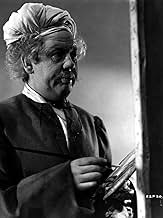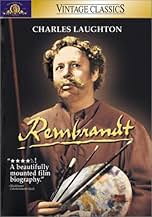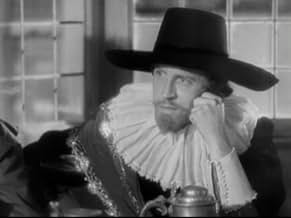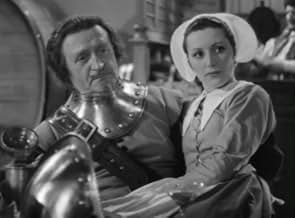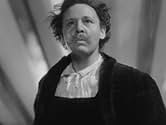Füge eine Handlung in deiner Sprache hinzuThe respected painter takes to drink and faces down scandal after his wife dies.The respected painter takes to drink and faces down scandal after his wife dies.The respected painter takes to drink and faces down scandal after his wife dies.
- Auszeichnungen
- 1 wins total
Handlung
WUSSTEST DU SCHON:
- WissenswertesSam Livesey, the father of three other actors in this movie--Roger Livesey, Barry Livesey, and Jack Livesey--died the day after this film was released in London.
- PatzerWhen Rembrandt reveals the newly completed painting, 'The Night Watch', we see not the full, original version that he in fact painted, but the drastically butchered version that was made over 40 years after his death, when the painting was moved from its original exhibition space in the Kloveniersdoelen to a less capacious display space in the Amsterdam Town Hall in 1715.
- Zitate
Rembrandt van Rijn: And of a sudden he knew that when one woman gives herself to you, you possess all women. Women of every age and race and kind, and more than that, the moon, the stars, all miracles and legends are yours. Brown-skinned girls who inflame your senses with their play, cool yellow-haired women who entice and escape you, gentle ones who serve you, slender ones who torment you, the mothers who bore and suckled you; all women whom God created out of the teeming fullness of the earth, are yours in the love of one woman.
- Crazy CreditsOpening credits prologue: In the seventeenth century Holland was a world power, her ships carried treasure to Amsterdam from all parts of the earth. But her proudest glory was the son of a miller from Leyden, Rembrandt Van Rijn, the greatest painter that has ever lived. He died in obscurity, his belongings no more than a few shillings.
Today no millionaire is worth the money the works of Rembrandt would realise, if ever offered for sale.
- VerbindungenFeatured in Dumb Dora Discovers Tobacco (1945)
Alexander Korda, the founder of London Films, appears to be an altogether intriguing personality in cinema history. Brian Eggert in his Deep Focus review nicely observes that he frames his characters "in a way that personalizes the drama, seeing them as people and not dry historical figures." How beautifully this notion occurs to manifest itself in this picture. His REMBRANDT is a movie which is far from any biographical approach but rather stands out as an insight into an artist tormented by conflict between the gravity of 'properly social' requirements and the eagle's wings of inspirations - a genius whose life and work are far from 'too picturesque' traditionalized sweetness. Therefore, Emerson's quote, which I entailed at the beginning of my review, seems to correspond to that development which we find in this barely 'ornamented' 80 minute-long film.
The fact that Korda's movie boasts of many charming moments, beautiful camera shots, dazzling costumes and stunning cinematography remains pretty indisputable. Although the recreation of the Amsterdam of the time does not occur to be fully satisfactory due to certain lacks of possibilities at hand, the interiors make for artistic impressions. The cinematographer Georges Perinal powerfully employs his efforts to combine visual with overtones (consider Rembrandt's indicative love scene with his wife to come, the shadows, the name of his desire written on the table and the ever present storm that sets the tone for the sensually typical moments on the screen). But it is not where the film's triumph really lies.
When seeing the film nowadays, it seems that we are watching quite a modern approach to the 'interpretations' of an artistic personality. The movie, as I have mentioned before, does not focus on descriptive approach of Rembrandt's paintings but rather on the protagonist who speaks his mind, shares what lies deep down his heart. In this way, it's not just like "I am going to present to you a life of an artist" but he invites a viewer for a fruitful discourse of perceptions. Of course we could quarrel here to what extent it is the historical Rembrandt. Ignoring some cinematic liberties taken with the genial leading hero of art, we are at least supplied with a vibrant, vital, engrossing image of a man who grows in both skill and thought. Isn't that what many of us long for in movies?
Apart from flawlessly delivered biblical verses corresponding to his life experience, Rembrandt (Charles Laughton) shares with us his thoughts about life, women, social status, success, his vision of the 'caged' world. His inner dictates allow him to reveal himself, his struggles between vision and reality, 'women' and 'wives,' conventions and Love. As the movie skips all glorification, all baseless idealization or illusionary assumptions, we may 'properly' talk about the movie in terms of Korda's revolutionary approach along with Laughton's revelatory portrayal that deeply focus on the humanity of character. This 'humanization' refers to many scenes from the frequently discussed rejection of THE NIGHT WATCH when Rembrandt powerfully makes it clear to everybody that he wanted to 'paint men. Soldiers. Company marching out' instead of glorified 'gentlemen of rank and position' through his encounter with one of his 'lowest of the low' subjects of painting, a beggar (played by Roger Livesey) along with the lesson both learn from each other, Rembrandt's visit at his hometown Leyden where he aims at recognizing his sense of belonging and hopes to restore his sense of attachment... Concluding from the turmoil, an artist belongs nowhere but his inner individualized existence.
In one scene, Rembrandt says: "Every man is a destined path." Nowhere does it appear as clear as in his relation to WOMEN. He seems to be in love with his wife Saskia (whom we actually never see on screen) but as soon as we appreciate the witty verses in a skillful game of words, funeral chimes toll over the windowed husband mourning and grief. In one moment when he tries to forget the sorrows, he spills the beans about the inner desires (I need a woman I can call my wife) and, unreasonably, gets married to his housekeeper Geertje Dirx (Gertrude Lawrence). However, she symbolizes all that is 'material' and 'down-to-earth' in a subtle man's perception of a woman. "Use your common sense" seems to be the slogan that does not only takes hold of her but which also interrupts the artist's great moment of inspiration. As a cure comes a young and beautiful Hendrickje Stoffels. Strikingly similar in looks to the artist's wife, she inflames jealousy within the envious woman and the Sanhedrin-like assembly of accusers. Within the moral and financial hazards, the love of the two does not find obstacles serious enough to spoil their feelings.
ELSA AND CHARLES supply the movie solely with power scenes of unique chemistry. Brian Eggert memorably points out that "Laughton's busy hands and eyes create an observant, thoughtful character" being "bold yet timid and modest, as only a poor but gifted genius could be." However, he shines fully at Elsa's side Their most unforgettable scene shows them 'recreate' their first meeting when he looks at her as both and artist and a man. With its height of emotions within 'from the inside out' method, derived from Stanislavskyan school, the moment beautifully addresses human longing for the possibility to experience the happiest moments of life once again. Yet, at the same time, it draws parallels with an intriguing assumption that true love is the only source of happiness in anyone's life.
A highly worth seeing movie about a man whose was a destined path and yet a man whose modest approach derived from Solomon's words of wisdom have resulted in transcending portraits that still personify absorbing developments of artists tormented by storms yet touched by the grace of talent...and inspiration growing in a ray of enlightenment.
- marcin_kukuczka
- 19. Jan. 2013
- Permalink
Top-Auswahl
- How long is Rembrandt?Powered by Alexa
Details
- Erscheinungsdatum
- Herkunftsland
- Sprache
- Auch bekannt als
- Büyük Ateş-Rembrandt
- Drehorte
- Denham Studios, Denham, Buckinghamshire, England, Vereinigtes Königreich(Studio, uncredited)
- Produktionsfirma
- Weitere beteiligte Unternehmen bei IMDbPro anzeigen
- Laufzeit1 Stunde 25 Minuten
- Farbe
- Seitenverhältnis
- 1.37 : 1
Zu dieser Seite beitragen



